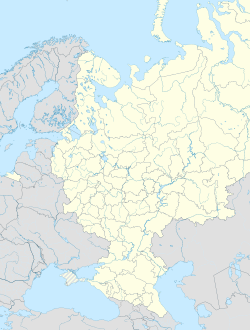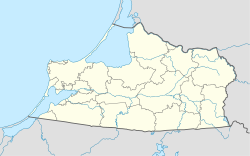Prigorkino
| Lost place
Prigorkino / Karben
Пригоркино
|
||||||||||||||||||
|
||||||||||||||||||
|
||||||||||||||||||
Prigorkino ( Russian Пригоркино , German Karben , until 1931 Carben ) was a village in the southwest of today's Russian Oblast Kaliningrad (Koenigsberg area) in the area of today's urban district Mamonowo . It was no longer inhabited after 1946 and is largely derelict. Since 2007 a memorial stone with the sign CARBEN – PRIGORKINO – SIEGFRIED 1764–1945 has been commemorating the former family of the estate.
location
Karben was 2 km west of the district town of Heiligenbeil and could be reached by land from there. Heiligenbeil was also the next train station on the former Berlin – Königsberg – Eydtkuhnen line of the Deutsche Reichsbahn, which now runs between Malbork ( Marienburg ) and Kaliningrad ( Königsberg (Prussia) ) . Today the Russian-Polish border is just four kilometers south of Prigorkino.
Surname
The first form of the name was Carwan (1406), then Carben prevailed until the place was renamed Karben on February 17, 1931 . The term Karben was used more frequently in Germany.
history
In 1406 the village of Carben was first mentioned as a Prussian settlement . The Teutonic Order awarded Carben in 1469 to Friedrich von Berenfelde , whose daughter brought the estate into her marriage with Georg von Parck on Pareyken near Labiau .
The descendant Hans Wilhelm Parck exchanged the estate with Duke Albrecht in 1553 for the Warnikam estate near Heiligenbeil, so that since then Carben has been owned by the sovereign as a preliminary work . In 1628 a chamber office was established here.
Friedrich Wilhelm I. signed Carben over to his wife Luise Henriette von Oranien in 1652 to strengthen her personal property . In Karben in 1679 the Great Elector began the hunt across the Curonian Lagoon .
In 1760, the pastor's son Gottfried Daniel Siegfried, who was born in Heiligenbeil, married Marie Louise Lederich , daughter of the bailiff von Carben, and after his death he succeeded him as bailiff and tenant of the domain. Ferdinand Siegfried acquired the office of Carbene in 1811 and, with his sons ( Oscar Ferdinand Siegfried ), expanded the property in 1821 to include the forest estate Vorderwalde (today in Polish: Podleśne) and the goods Skandlack (Skandławki) and Jäglack ( in the district of Rastenburg (today in Polish: Kętrzyn)) Jegławki). The last German gentleman on Carbene was Gerhard von Siegfried .
The estate remained in the possession of the Siegfried family until 1945 . The manor house was built in the classicist Italian villa style between 1860 and 1862, but was blown up in the 1950s. Some of the manor's stables could still be seen until 1997, after which the property, including the garden designed by the architect Laraß and the manor cemetery, fell into disrepair.
On June 11, 1874, the rural communities Carben (Russian: Prigorkino), Leysuhnen (1938-1945 Leisuhnen , Russian: Schtschukino), Polish Bahnau (from 1920 German Bahnau , Russian: Baltijskoje), Prussian Bahnau (Russian: Selenodolskoje) and the Manor districts of Büsterwalde, Büsterwalde Forst, Carben, Gerlachsdorf (Polish: Zgoda), Ruhnenberg (Polish: Runka), Schettnienen (Russian: Schtschukino) and the guard shack of the Carben district (renamed the Karben district from 1931). In 1931, after extensive restructuring and incorporation, five municipalities still belong to the Karben district: Deutsch Bahnau, Karben, Leysuhnen, Prussisch Bahnau and Schettnienen, on January 1, 1945 only four: Deutsch Bahnau, Karben, Leisuhnen and Preußisch Bahnau.
In 1910 Carben (rural community and manor district) had 226 inhabitants. In 1933 there were 191, and in 1939 only 178. Until 1945 the place belonged to the district of Heiligenbeil in the Prussian province of East Prussia .
Karben came under Soviet administration in 1945 and was named Prigorkino in 1947. Today the village area is in the urban district of Mamonowo in the Russian Oblast of Kaliningrad .
church
Karben belonged until 1945 with his predominantly Protestant population of the parish Heiligenbeil in the same parish of the Church of the Old Prussian Union . The last German clergy were Pastors Paul Bernecker and Hans Krumm .
literature
- Wulf D. Wagner : The goods of the district of Heiligenbeil in East Prussia . Rautenberg, Leer 2005, ISBN 3-7921-0640-X .
Web links
Individual evidence
- ↑ Through the Указ Президиума Верховного Совета РСФСР от 17 ноября 1947 г. «О переименовании населённых пунктов Калининградской области» (Ordinance of the Presidium of the Supreme Council of the RSFSR "On the Renaming of Places of the Kaliningrad Oblast" of November 17, 1947)

